ANA POPOVIC.
Review & Photo’s by Mark Fredell




 MF: Well alright, terrific. I know I can’t wait to see you next week, I’ve really been looking forward to it. Now I wanted to talk to you for a minute, you have always been one of those players that has always been really well respected by other players, yet it seems that with what I call the average weekend or blues fest blues fan, you aren’t that well known. But I think you’ve actually got a pretty interesting history as far as when you started out, and some of your associations and such, would you mind sharing some of your history with my listeners?
MF: Well alright, terrific. I know I can’t wait to see you next week, I’ve really been looking forward to it. Now I wanted to talk to you for a minute, you have always been one of those players that has always been really well respected by other players, yet it seems that with what I call the average weekend or blues fest blues fan, you aren’t that well known. But I think you’ve actually got a pretty interesting history as far as when you started out, and some of your associations and such, would you mind sharing some of your history with my listeners?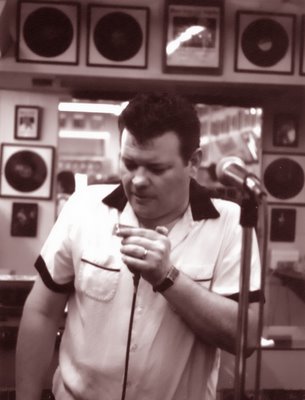
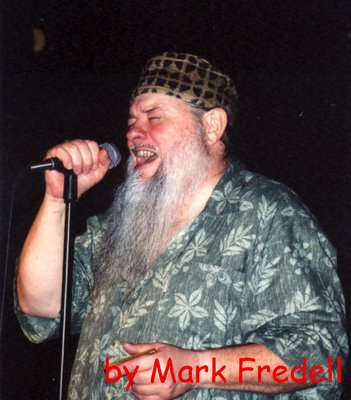
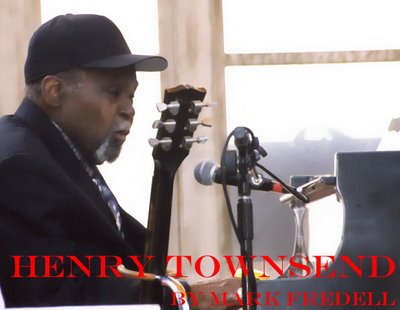

 then at 9 o’clock it was show time and they began, brother John is a solid guitar player, though he toured with Buddy as the keyboard player on the Damn Right I Got the Blues Tour back in the early 90’s he’s also a pretty good singer, they stuck to mostly straight bar room blues for the first few numbers then in the middle of a song, The man of the hour took to the stage strapped on his black and white poke-a-dot strat and they cut deep into Muddy Waters ‘She’s Nineteen Years Old’.
then at 9 o’clock it was show time and they began, brother John is a solid guitar player, though he toured with Buddy as the keyboard player on the Damn Right I Got the Blues Tour back in the early 90’s he’s also a pretty good singer, they stuck to mostly straight bar room blues for the first few numbers then in the middle of a song, The man of the hour took to the stage strapped on his black and white poke-a-dot strat and they cut deep into Muddy Waters ‘She’s Nineteen Years Old’.  then there were two more slow blues and Buddy thanked everyone for coming out to help celebrate his birthday. He seemed genuinely moved saying that for a while he never thought he’d make it this long. He closed by stating “Ah man, I don’t want to play right now I just wanna go down stairs and get high.” He left the stage and disappeared to the dressing rooms; only to emerge a short time later and greet some of his well wishers. The band continued to play, John pulled
then there were two more slow blues and Buddy thanked everyone for coming out to help celebrate his birthday. He seemed genuinely moved saying that for a while he never thought he’d make it this long. He closed by stating “Ah man, I don’t want to play right now I just wanna go down stairs and get high.” He left the stage and disappeared to the dressing rooms; only to emerge a short time later and greet some of his well wishers. The band continued to play, John pulled  Marquel to the vocal mic and he cut loose on some classic soul tunes, some Al Green, King Floyd and others, then it was time for the first break. Brother John asked for Buddy to return to the stage and they brought out a huge cake, the whole room sang the birthday song, he blew out the candles and a lovely waitress in the house brought him his present (from the staff) a custom painted Fender Strat with his image, the Chicago skyline, some classic club signs and more painted on it, as well as his name in flaming lettering in the frets of the neck. Buddy seemed to tear up a bit as he thanked every once again. By this time Koko Taylor was in the house sitting in the VIP area, also in attendance were Wayne Baker Brooks, Nick Moss, Mathew Skoller and other Chicago blues veterans. As the staff was serving up cake there was mixing and mingling, Buddy took up a seat at the front of the bar and signed autographs, then after a while the
Marquel to the vocal mic and he cut loose on some classic soul tunes, some Al Green, King Floyd and others, then it was time for the first break. Brother John asked for Buddy to return to the stage and they brought out a huge cake, the whole room sang the birthday song, he blew out the candles and a lovely waitress in the house brought him his present (from the staff) a custom painted Fender Strat with his image, the Chicago skyline, some classic club signs and more painted on it, as well as his name in flaming lettering in the frets of the neck. Buddy seemed to tear up a bit as he thanked every once again. By this time Koko Taylor was in the house sitting in the VIP area, also in attendance were Wayne Baker Brooks, Nick Moss, Mathew Skoller and other Chicago blues veterans. As the staff was serving up cake there was mixing and mingling, Buddy took up a seat at the front of the bar and signed autographs, then after a while the  Brother John Band retook the stage and it wasn’t long before the birthday boy was back up, guitar in hand, singin’ and playing with passion and intensity that only he Buddy Guy can conjure. After another three songs he was off again, and the band tore through another fine set of blues and soul keeping the room grinning from ear to ear. At the midway point of this second set both Skoller and Moss were invited up and they played some very satisfying straight (no chaser) Chicago blues. Skoller blew some tasty harmonica while Moss’ guitar was in the pocket. As the second set wrapped up, the crowd began to thin a bit and before to long Buddy himself departed for the night, leaving perhaps a hundred or so diehards in the room to soak up one more stellar set from Brother John and company, the highlight of which had to be Marquel’s awe inspiring version of Sam Cooks ’A Change Is Going To Come’ the band wound down just past 1:00am and as I hung out for them to pack up, the temperature in the room was finally approaching bearable though the heat generated from the stage is what has left the biggest imprint in my mind. To be able to share in the reaching of such a milestone for some one that is arguably one of the most important members of the blues world is a memory that will stay with me forever. Happy 70th Buddy Guy and here’s a wish for many more years ahead for you.
Brother John Band retook the stage and it wasn’t long before the birthday boy was back up, guitar in hand, singin’ and playing with passion and intensity that only he Buddy Guy can conjure. After another three songs he was off again, and the band tore through another fine set of blues and soul keeping the room grinning from ear to ear. At the midway point of this second set both Skoller and Moss were invited up and they played some very satisfying straight (no chaser) Chicago blues. Skoller blew some tasty harmonica while Moss’ guitar was in the pocket. As the second set wrapped up, the crowd began to thin a bit and before to long Buddy himself departed for the night, leaving perhaps a hundred or so diehards in the room to soak up one more stellar set from Brother John and company, the highlight of which had to be Marquel’s awe inspiring version of Sam Cooks ’A Change Is Going To Come’ the band wound down just past 1:00am and as I hung out for them to pack up, the temperature in the room was finally approaching bearable though the heat generated from the stage is what has left the biggest imprint in my mind. To be able to share in the reaching of such a milestone for some one that is arguably one of the most important members of the blues world is a memory that will stay with me forever. Happy 70th Buddy Guy and here’s a wish for many more years ahead for you. 


 Originally slated as a double bill with another Bay area guitarist Ron Hacker; Hacker unfortunately was under the weather and couldn’t make the trip, but Thompson and his band the Resistors made up for it in spades. Starting off solo with his acoustic guitar (pick-up literally duct tapped in place) Ron and the guys performed with an inspired fervency. A passionate and energetic performer, Ron dances and moves with almost reckless abandon. Not only playing guitar, but piano and harmonica, at times all at once. He’s a good singer too. The music was a blend of straight blues with lot’s of slide ala Elmore James, J.B. Hutto and Robert Nighthawk to some solid roots rockers from the likes of Little Richard and Jerry Lee Lewis to the Blasters and even a rendering of the Mink DeVille inspired ‘Cadillac Walk’. They played (mostly) fast and hard, slowing the tempo only a few times during their first 2 sets. Set one ran just over 90 minutes which anyone that frequents the clubs these days knows is a long one, then within about 15 minutes they were back at it hitting just as hard for set 2, rockin’ & rollin’ till about 5 minutes before midnight. At this point the majority of the audience figured it was over and headed out the door, which as it turned out was a BIG mistake, after a very brief 5 minute break Ron and the Resistors took the stage one more time. During the first song I had to, well lets say ‘take care of some business’ and while I was indisposed that first song ended and I could hear Ron talking to the people though I couldn’t make out what he was saying. So imagine my surprise as I came back into the show room to see not just Thompson and his band on stage but also Chris Isaak and half of his band as well.
Originally slated as a double bill with another Bay area guitarist Ron Hacker; Hacker unfortunately was under the weather and couldn’t make the trip, but Thompson and his band the Resistors made up for it in spades. Starting off solo with his acoustic guitar (pick-up literally duct tapped in place) Ron and the guys performed with an inspired fervency. A passionate and energetic performer, Ron dances and moves with almost reckless abandon. Not only playing guitar, but piano and harmonica, at times all at once. He’s a good singer too. The music was a blend of straight blues with lot’s of slide ala Elmore James, J.B. Hutto and Robert Nighthawk to some solid roots rockers from the likes of Little Richard and Jerry Lee Lewis to the Blasters and even a rendering of the Mink DeVille inspired ‘Cadillac Walk’. They played (mostly) fast and hard, slowing the tempo only a few times during their first 2 sets. Set one ran just over 90 minutes which anyone that frequents the clubs these days knows is a long one, then within about 15 minutes they were back at it hitting just as hard for set 2, rockin’ & rollin’ till about 5 minutes before midnight. At this point the majority of the audience figured it was over and headed out the door, which as it turned out was a BIG mistake, after a very brief 5 minute break Ron and the Resistors took the stage one more time. During the first song I had to, well lets say ‘take care of some business’ and while I was indisposed that first song ended and I could hear Ron talking to the people though I couldn’t make out what he was saying. So imagine my surprise as I came back into the show room to see not just Thompson and his band on stage but also Chris Isaak and half of his band as well. 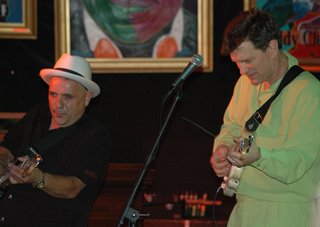 Lime green outfit, guitar in hand singin’ an old blues rocker. Chris and his guys who one by one hit the stage until you had both bands filling it sang and danced and played for a full half hour then like in a flash of light they were gone. Ron thanked everybody for coming out and the evening ended. What a great surprise. Ron Thompson and the Resistors were great. And to be treated to a star the magnitude of Isaak in such a setting made it a doubly good treat.
Lime green outfit, guitar in hand singin’ an old blues rocker. Chris and his guys who one by one hit the stage until you had both bands filling it sang and danced and played for a full half hour then like in a flash of light they were gone. Ron thanked everybody for coming out and the evening ended. What a great surprise. Ron Thompson and the Resistors were great. And to be treated to a star the magnitude of Isaak in such a setting made it a doubly good treat. 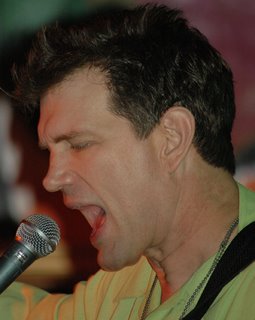
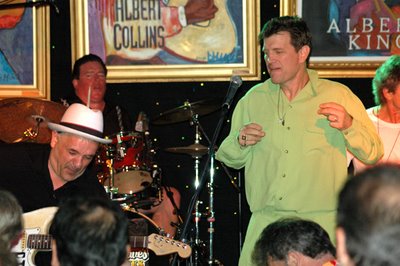
I recommend a visit to http://www.rocknrollpoet.com/ to discover the passion, vitality, sincerity and diverse musical talents of Michael Ubaldini. Mike’s an artist that defies categorization...the Los Angeles times stated he is better than Bruce Springsteen at probing the national soul. He began picking out tunes on guitar at the age of seven playing Hank Williams and Ray Charles songs his father taught him. Influenced early on by the likes of Otis Redding, Elvis, Creedence Clear Water Revival, The Rolling Stones, Chuck Berry, Johnny Cash, Gene Vincent, Muddy Waters, The Beatles and Bob Dylan, as well as other writers and poets. In early 1980 he formed his first band "The Earwigs" at the age of 16, and recorded the 45 inch single "Here Come the Earwigs". They subsequently disbanded in 1984.
From his heart and soul 'Michael' with his cranking band (or with only his acoustic guitar and harmonica) goes against the grain of today's fabricated pop and 'watered down' Punk and Country formula music. Michael plays and sings his songs with a passion and integrity rarely heard these days. He lives and has lived his songs. Singing them with honesty, integrity and sincerity. He inked a record deal with EMI in 1994. His debut CD 'Mystery Train' produced by Lee Rocker of the Stray Cats which featured Michael's original material and guest guitarist Brian Setzer. Brian invited Michael to open several shows. In 1999 Michael abandoned his electric guitar and released the indie classic 'Acoustic Rumble' a haunting disc that received rave reviews in the United States and was the LA Times pick for #1 Disc of the year (1999) as well as, 10th best of the entire decade. In May 2001, after releasing the artistic follow up 'American Blood', the 'Rock N Roll Poet' strapped on his electric guitar and toured the United States, Canada, Europe, and Japan. When arriving home he formed a new band and the result was 2002's 'Rock N Roll Saloon'. Critically acclaimed in the United States and Europe it was picked by the Orange County register as "One of the top records of the year!". 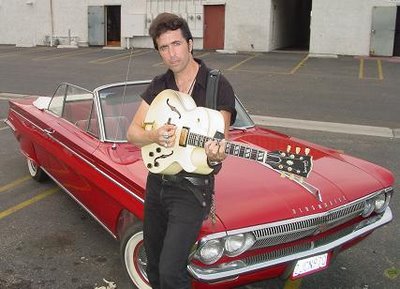
2005 would turn out to be a big year for Michael with the release of "Avenue of Ten Cent Hearts", an impressive mix of 15 solid Ubaldini originals showcasing his wide range of musical styles. A favorite of fans and critics alike, it earned Michael five star reviews in the United States and Europe. He also won two Orange County Music Awards for Best Roots rock and Best Live Male Performer. A tour of the American South, and the United Kingdom which finished at The Cavern Club in Liverpool England, home of the Beatles.
Now in 2006 Michael Ubaldini is back with a new release ‘Empty Bottles & Broken Guitar Strings’ 20 tracks of rootsy American rock & roll!
He’s not Blues, but Michael is definantly bluesy. As a singer he is rough and reliable, a solid guitar player and simply one of the best “unknown” songwriters in the land today.
Michael is a Rock N Roll Poet.
He is a true...American Rebel.

all photos courtesy of Micheal Ubaldini's web site.
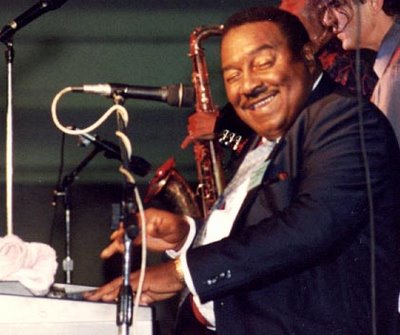
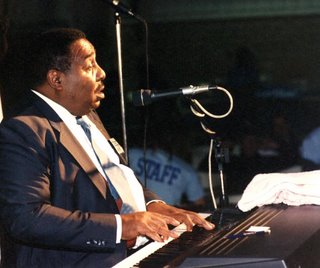
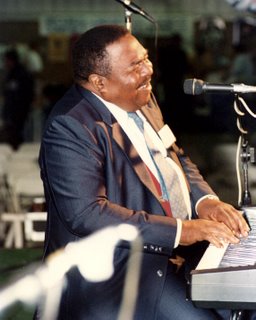
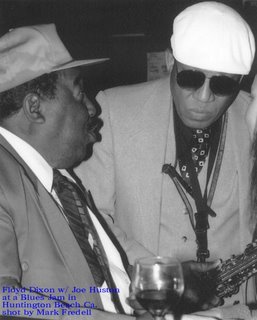
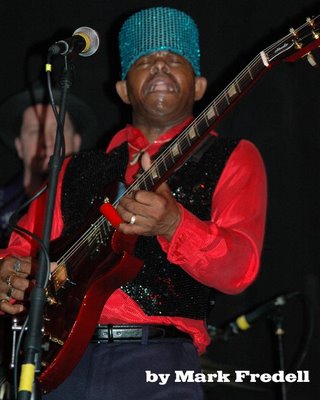
So the weekend of July 7th was a guitar enthusiasts dream come true; on Saturday that weekend you had two great shows by two of the best players in the land Tinsley Ellis was stopping by Famous Dave’s and Lil’ Ed (Williams) & the Blues Imperials where playing at the Narrows in Navarre, I once again hosted the Showcase of Rhythm & Blues on KFAI radio and had the pleasure of getting to do a short interview with each of them. Tinsley and I talked for maybe four minutes since he was actually driving at the time but I caught Ed as he and the band were getting checked into their hotel and that chat lasted a bit longer and went a little something like this….
Mark Fredell: On the phone with me right now is Mr. Lil’ Ed. Ed how you doing brother?
Lil’ Ed: Hey Mark, we’re doing good, how you doing?
M.F.: Just great Man.
Ed: Awe good.
M.F: Now I haven’t seen you since last month at Buddy Guys club in Chicago.
Ed: Yeah that’s right.
M.F: Now I know you were going to try and get down here to the station but of course traffic and all that road construction I guess we’ll just do this on the phone. So how was last nights show? You were somewhere in Wisconsin right?
Ed: Yep we we’re in Myrtle Wisconsin, we had a really good time. I had a chance to present the people some stuff from my new Cd.
M.F: Right that just came out in the past few weeks right, tell the people a little about it?
Ed: Right it just came out it’s called Rattleshake, and I’ll have some of them with me down at the club tonight.
MF: Now so the people can know your playing at the Narrows to night in Navarre, what time will you be starting?
Ed: I think around nine or nine thirty, something like that.
MF: Ya know for the people that don’t know it astonishes me in the blues world, as good as you and the band are that there are so many blues fans that haven’t actually seen or heard you, I hear things like oh yeah I’ve heard OF him but they don’t necessarily know what you sound like. But maybe you could share with us a bit about who your influences are where your sound comes from that kind of thing?
Ed: Well you know my influences are really all the old guys, you know my uncle ( J.B. Hutto) started me off. And after then he got me listening to guys like Muddy Waters, Jimmy Reed, Elmore James, all those guys you know. Yeah all those guys are basically my influences.
MF: Right. You know you keep it real simple you know it’s real, straightforward gutbucket blues in the finest tradition of Chicago blues (Ed: YEAH…) It’s real Chicago party music.
Ed: That’s right, I like it like that.
MF: Now for all those out there that haven’t seen this man he’s got a great grin, he’s got a smile that goes from ear to ear, his teeth just shining and he’s usually grinning like that as he’s doing some sort of back bend or duck walk across the stage ( Ed laughs on the other line… Yeah that’s right). Its great, but you know that tone you have I gotta say it’s almost eerie, not just how much you look like you uncle (Ed. Well thank you) but your sound you sound so much like him too. The sound you get is almost like a highbred of J.B. and Elmore James.
Ed: Well yeah, you know those are really the two guys I focused on you know J.B he started me off teaching me and then when I heard Elmore, wow, I just loved his style and his tone and I wanted to combine those two together you know.
MF: Well Ed to my ear at least you did it, and it’s a good thing (Ed: Thank you.) Ah E you know I love you guys, and I can’t say enough about what a great show this band does. I was trying to remember the first time I saw Lil’ ed & the Blues Imperials and I don’t recall if it was at the Long Beach Blues Festival in the late 80’s or if was on that Alligator Records anniversary tour you guys all did so many years ago (Ed: Oh yeah that was fun that tour, I don’t remember which one we met at I guess I’m getting old…) Well it was one of them but what I remember it was like the top of my head got blown off simply from the sheer energy and joy you all put into every song on stage.( Ed Laughs…) Anyways Ed what are some of the highlights on this new record?
Ed: You know I really like this new record because it’s got a lot of more of me than what most people think I am, I got a little bit of country and western, blues style, there’s a little bit of soul and even a little rock & roll in there. So this is really more about the stuff I like to listen too you know cause I listen to all types of music now a days. You know back then (when I was starting out) I listened to mostly all the old blues guys cause I was trying to learn it but now, I like to listen to all types of music I like to feel it and hear what’s going on cause every body has something different to say. 
MF: Alright then. Now Ed you gotta tell me about, tell the story about your first recording session. Now you had already been playing for some ten or 11 years when you were invited to record for Alligator Records for their ’New Blue Bloods’ record right?
Ed: Oh Yeah, yeah Bruce (Iglauer) had come in when we were playing in a bar called B.L.U.E.S. in Chicago. And on a break he came to introduce himself to me and you know I didn’t really know him I didn’t know Bruce at all. But he introduce himself and told me he wanted us to do a couple of songs for a compilation record he was putting out, which was cool with me you know cause me and my brother (the Imperials bass player Pookie) was trying to, um we were gonna safe up some money and cut a 45 cause records were still out then. So we set the date and got down to the studio about 5, you know I was working at the carwash and my brother was too so we got there in our work clothes cause we didn’t have time to go home and change so there we was boots and all we set up and started playing. At first Bruce told us to just play like we always do, just have some fun and play some songs, well none of us had ever been in a studio before, so that’s exactly what we did, and we finished a song or two and all the people in the control room were hollering and hootin’ so I started doing duck walks and back bends (MF: all in the confines of the studio… Laughter…) Yeah that’s right, right there, just getting wild and crazy. So then after a while he (Bruce) cam out and he said man this is great, lets go ahead and do an album, we shook hands and just kept going, we had cut 30 songs in about three hours, just kept the tape rolling. (MF: I heard that some where in there some one made a beer run too…) Yeah they did I’m not sure who that was.
MF: I guess your first couple of albums were done pretty much the same way weren’t they? Just go to the studio and cut every thing live…
Ed: That’s right, that one (Rough Housin’), Chicken Gravy & Biscuits, then on What You See Is What You Get we did just a couple of overdubs and then the next one to. This one (Rattleshake), this last one we pretty much just went in and cut it. No overdubs or retakes on this one really.
MF: Now the thing I want to know Ed is when are you going to work that deal with Bruce to release all those extra songs from those first sessions?
Ed: I don’t really know, probably when we’re both old and grey and both can’t walk.
MF: Well ok but that’s along time off. Ed I want to thank you for taking some time to spend with us here at KFAI I’ll see you tonight at the Narrows in Navarre, Now we’re gonna get back into the music with the title track form that second record of yours Ed what was that called?
Ed: Oh thanks Mark. That was Chicken Gravy and Biscuits….
MF: That’s right, Chicken Gravy and Biscuits thanks again Ed see ya later my friend…
Later that evening I headed out to catch the first couple sets from Ed and the Imperials it was great as usual though the first set was hampered a bit by some amplifier troubles though once they got them worked out Ed and the guys put on a typically stellar show.
This interview aired live of KFAI Radio in the Twin Cities on July 8th, 2006 and was also published in the paper Blue Monday.